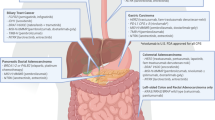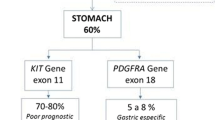Abstract
Background
Comprehensive analyses of cancer-related genomic alterations are expected to lead to increased availability of targeted therapies. However, in patients with gastrointestinal (GI) cancers, the utility of genomic profiling is unclear because of common non-druggable alterations and rapid disease progression that prevent a sufficient time period to seek targets.
Objective
The aim of this study was to determine the utility of genomic profiling tests in patients with GI cancers.
Methods
The subjects of this retrospective study were patients with GI cancers and patients with non-GI cancers who underwent tissue-based genomic profiling at a single institution from April 2017 to October 2020. The profile of gene alterations, frequency of tumor mutational burden-high (≥ 10 Muts/Mb), and accessibility of recommended molecular targeted therapy were compared between patients with GI cancers and patients with non-GI cancers.
Results
In all, 133 patients with GI cancers and 63 patients with non-GI cancers were included. The genomic profiles of GI cancers showed the highest frequencies of TP53, KRAS, and APC mutations and a significantly lower frequency of PIK3CA mutations than those of non-GI cancers. Tumor mutational burden-high was significantly less prevalent in GI cancers (4% vs 20%, p = 0.008). Twenty-nine patients with GI cancers (40%) and 35 patients with non-GI cancers (56%) were recommended for targeted therapies based on the findings. Among them, seven patients each with GI cancers and non-GI cancers received the recommended therapy on their genomic findings, which showed similar treatment accessibility between the GI and non-GI cancer groups (10% vs 11%, p = 0.791). HER2-targeted and BRAF-targeted therapies were the primary treatments administered to patients with GI cancers.
Conclusions
Although their genomic profiles revealed fewer druggable sites, patients with GI cancers accessed targeted therapies similarly to patients with non-GI cancers. The utility of genomic profile testing in patients with GI cancers was highlighted to determine if patients can receive specific treatments, such as HER2-targeted and BRAF-targeted therapies.


Similar content being viewed by others
References
Van Allen EM, Wagle N, Stojanov P, Perrin DL, Cibulskis K, Marlow S, et al. Whole-exome sequencing and clinical interpretation of formalin-fixed, paraffin-embedded tumor samples to guide precision cancer medicine. Nat Med. 2014;20:682–8.
Kou T, Kanai M, Yamamoto Y, Kamada M, Nakatsui M, Sakuma T, et al. Clinical sequencing using a next-generation sequencing-based multiplex gene assay in patients with advanced solid tumors. Cancer Sci. 2017;108:1440–6.
Cheng DT, Mitchell TN, Zehir A, Shah RH, Benayed R, Syed A, et al. Memorial sloan kettering-integrated mutation profiling of actionable cancer targets (MSK-IMPACT). J Mol Diagn. 2015;17:251–64.
Sunami K, Ichikawa H, Kubo T, Kato M, Fujiwara Y, Shimomura A, et al. Feasibility and utility of a panel testing for 114 cancer-associated genes in a clinical setting: a hospital-based study. Cancer Sci. 2019;110:1480–90.
Howlader N, Noone AM, Krapcho M, et al. SEER Cancer Statistics Review, 1975–2018, National Cancer Institute. Bethesda, MD. Based on November 2020 SEER data submission, posted to the SEER website, April 2021. https://seer.cancer.gov/csr/1975_2018/. Accessed 29 Mar 2022
Koizumi W, Narahara H, Hara T, Takagane A, Akiya T, Takagi M, et al. S-1 plus cisplatin versus S-1 alone for first-line treatment of advanced gastric cancer (SPIRITS trial): a phase III trial. Lancet Oncol. 2008;9:215–21.
Conroy T, Desseigne F, Ychou M, Bouché O, Guimbaud R, Bécouarn Y, et al. FOLFIRINOX versus gemcitabine for metastatic pancreatic cancer. N Engl J Med. 2011;364:1817–25.
Valle J, Wasan H, Palmer DH, Cunningham D, Anthoney A, Maraveyas A, et al. Cisplatin plus gemcitabine versus gemcitabine for biliary tract cancer. N Engl J Med. 2010;362:1273–81.
Takeda M, Takahama T, Sakai K, Shimizu S, Watanabe S, Kawakami H, et al. Clinical application of the FoundationOne CDx assay to therapeutic decision-making for patients with advanced solid tumors. Oncologist. 2021;26(4):e588–96.
Inagaki C, Maeda D, Hatake K, Sato Y, Hashimoto K, Sakai D, et al. Clinical utility of next-generation sequencing-based panel testing under the universal health-care system in Japan: a retrospective analysis at a single university hospital. Cancers. 2021;13:1121.
Kuwata T, Wakabayashi M, Hatanaka Y, Morii E, Oda Y, Taguchi K, et al. Impact of DNA integrity on the success rate of tissue-based next-generation sequencing: lessons from nationwide cancer genome screening project SCRUM-Japan GI-SCREEN. Pathol Int. 2020;70:932–42.
Japanese Society of Medical Oncology, Japan Society of Clinical Oncology, Japanese Cancer Association, Naito Y, Aburatani H, Amano T, et al. Clinical practice guidance for next-generation sequencing in cancer diagnosis and treatment (edition 2.1). Int J Clin Oncol. 2021;26:233–83.
Nakamura Y, Taniguchi H, Ikeda M, Bando H, Kato K, Morizane C, et al. Clinical utility of circulating tumor DNA sequencing in advanced gastrointestinal cancer: SCRUM-Japan GI-SCREEN and GOZILA studies. Nat Med. 2020;26:1859–64.
Bos JL. ras Oncogenes in human cancer: a review. Cancer Res. 1989;49:4682–9.
Wang C, Fakih M. Targeting KRAS in colorectal cancer. Curr Oncol Rep. 2021;23:28.
Alzahrani AS. PI3K/Akt/mTOR inhibitors in cancer: at the bench and bedside. Semin Cancer Biol. 2019;59:125–32.
André F, Ciruelos E, Rubovszky G, Campone M, Loibl S, Rugo HS, et al. Alpelisib for PIK3CA-mutated, hormone receptor-positive advanced breast cancer. N Engl J Med. 2019;380:1929–40.
Chalmers ZR, Connelly CF, Fabrizio D, Gay L, Ali SM, Ennis R, et al. Analysis of 100,000 human cancer genomes reveals the landscape of tumor mutational burden. Genome Med. 2017;9:34.
Yarchoan M, Hopkins A, Jaffee EM. Tumor mutational burden and response rate to PD-1 inhibition. N Engl J Med. 2017;377:2500–1.
Gambardella V, Lombardi P, Carbonell-Asins JA, Tarazona N, Cejalvo JM, González-Barrallo I, et al. Molecular profiling of advanced solid tumours: the impact of experimental molecular-matched therapies on cancer patient outcomes in early-phase trials: the MAST study. Br J Cancer. 2021;125:1261–9.
Bertucci F, Gonçalves A, Guille A, Adelaïde J, Garnier S, Carbuccia N, et al. Prospective high-throughput genome profiling of advanced cancers: results of the PERMED-01 clinical trial. Genome Med. 2021;13:87.
Hainsworth JD, Meric-Bernstam F, Swanton C, Hurwitz H, Spigel DR, Sweeney C, et al. Targeted therapy for advanced solid tumors on the basis of molecular profiles: results from MyPathway, an open-label, phase IIa multiple basket study. J Clin Oncol. 2018;36:536–42.
Siena S, Di Bartolomeo M, Raghav K, Masuishi T, Loupakis F, Kawakami H, et al. Trastuzumab deruxtecan (DS-8201) in patients with HER2-expressing metastatic colorectal cancer (DESTINY-CRC01): a multicentre, open-label, phase 2 trial. Lancet Oncol. 2021;22:779–89.
Li BT, Smit EF, Goto Y, Nakagawa K, Udagawa H, Mazières J, et al. Trastuzumab deruxtecan in HER2-mutant non-small-cell lung cancer. N Engl J Med. 2022;386:241–51.
Kopetz S, Grothey A, Yaeger R, Van Cutsem E, Desai J, Yoshino T, et al. Encorafenib, binimetinib, and cetuximab in BRAF V600E-mutated colorectal cancer. N Engl J Med. 2019;381:1632–43.
Acknowledgements
The authors thank the investigators of the SCRUM-Japan GI-SCREEN study for their operation and data management. They also thank Enago (www.enago.jp) for the English language review.
Author information
Authors and Affiliations
Corresponding author
Ethics declarations
Funding
This research did not receive any specific grant from funding agencies in the public, commercial, or not-for-profit sectors.
Conflicts of Interest/Competing Interests
Takuro Mizukami has received grants from Taiho Pharma, Eli Lilly Japan, and Ono Pharma, and have received honoraria from Taiho Pharma, Chugai Pharma, Bayer Pharma, Merk Serono Pharma, Takeda Pharma, Eli Lilly Japan, Asahi Kasei Pharma Corporation, Otsuka Pharma, Bristol-Myers Squibb, and Ono Pharma. Tomoyo Oguri is an employee of Astra Zeneca K.K. Hiroyuki Takeda, Kiyomi Imoto, Kumiko Umemoto, Ayako Doi, Hiroyuki Arai, Yoshiki Horie, Takashi Ogura, Naoki Izawa, Hiroyuki Yamamoto, Yoshihisa Yamano, and Yu Sunakawa declare that they have no conflicts of interest that might be relevant to the contents of this article.
Ethics Approval
This study was approved by the Ethics Committee of St. Marianna University School of Medicine.
Consent to Participate
All patients provided written informed consent for genomic analysis and use of their data.
Consent for publication
Not applicable.
Availability of Data and Material
Not applicable.
Code availability
Not applicable.
Authors’ Contributions
HT and KI collected the data and performed the analyses. All authors interpreted the data, contributed to the writing and approved the final manuscript.
Rights and permissions
About this article
Cite this article
Takeda, H., Imoto, K., Umemoto, K. et al. Clinical Utility of Genomic Profiling Tests in Patients with Advanced Gastrointestinal Cancers. Targ Oncol 17, 177–185 (2022). https://doi.org/10.1007/s11523-022-00871-4
Accepted:
Published:
Issue Date:
DOI: https://doi.org/10.1007/s11523-022-00871-4




